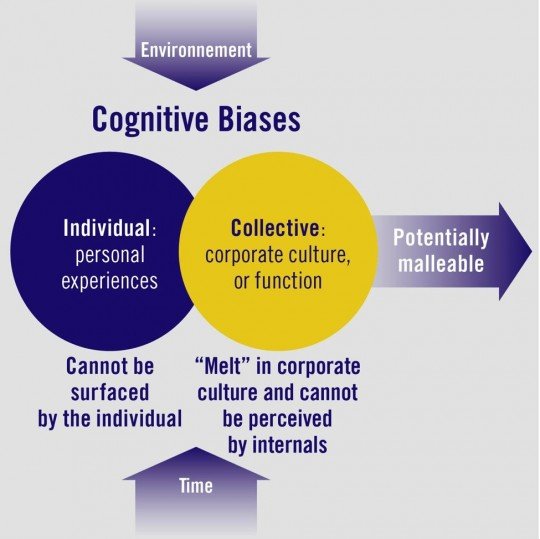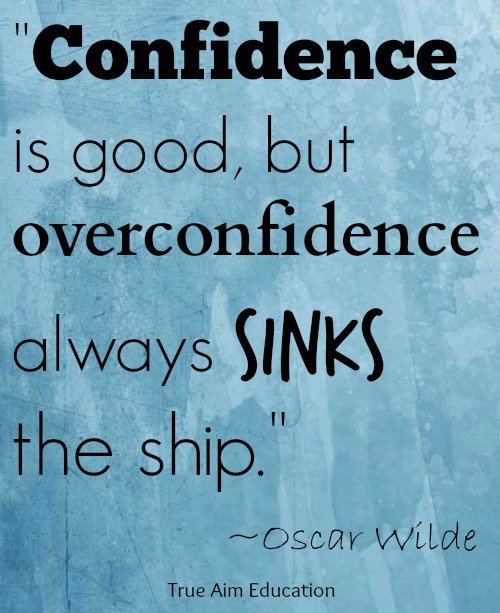Overconfidence To Judgment and The Cognitive Biases

Image Source
Still another potential judgmental bias, and one that has powerful and regularly negative impacts on our judgments, is the propensity to be overconfident in our own particular aptitudes, capacities, and judgments. We frequently have little awareness of our own restrictions, driving us to go about as though we are more certain about things than we ought to be, particularly on undertakings that are troublesome. Confidence in the recognition and reproduction of words hard to spell.
American Journal of Psychology found that for words that were hard to spell, individuals were correct in spelling them just around 80% of the time, despite the fact that they showed that they were 100% certain that they were correct. Journal of Personality and Social Psychology, requested that undergrads predict how another understudy would react in various circumstances.
A few participants made predictions about a kindred student whom they had recently met and interviewed, and others made predictions about their roommates. In the two cases, participants reported their confidence in every prediction, and accuracy was determined by the responses of the target persons themselves.
Journal of Personality and Social Psychology found that individuals who scored low rather than high on trial of spelling, rationale, grammar, and humor appreciation were likewise destined to indicate overconfidence by overestimating how well they would do. Apparently, poor performers are doubly cursed, they not exclusively can't predict their own aptitudes yet additionally are the most unaware that they can't do as such.
The inclination to be overconfident in our judgments can have some very negative impacts. At the point when onlookers affirm in courtrooms regarding their memories of a crime, they regularly are totally sure that they are distinguishing the right person. Be that as it may, their confidence doesn't correlate much with their genuine accuracy. This is, in part, why such a large number of individuals have been wrongfully indicted on the premise of inaccurate observer declaration given by overconfident witnesses.

Image Source
Cognitive Biases
Perhaps you are suspecting that the utilization of heuristics and the propensity to be affected by salience and accessibility don't appear that important, who really cares in the event that we purchase an iPod when the Zune is better, or on the off chance that we think there are more words that start with the letter R than there really are?
These aren't huge problems in the overall plan of things. In any case, things being what they are what appear to be perhaps to be pretty little errors and biases on the surface can have profound outcomes for individuals. For one, if the errors occur for many people, they can really include. Why might such a large number of individuals keep on buying lottery tickets or to bet their cash in gambling clubs when the probability of them ever winning is so low?
One plausibility, of course, is the representative heuristic individuals ignore the low base rates of winning and concentrate their consideration on the remarkable probability of winning a gigantic prize. What's more, the faith in astrology, which all logical proof proposes is not accurate, is probably driven in part by the salience of the events when the predictions do occur when a horoscope is correct, the correct prediction is exceptionally notable and may enable individuals to keep up the conviction.
Individuals may likewise take more care to prepare for impossible occasions than for more likely ones in light of the fact that the improbable ones are more remarkable or open. For example, individuals may imagine that they are more prone to pass on from a terrorist attack or as the result of a crime than they are from diabetes, stroke, or tuberculosis. Be that as it may, the chances are considerably greater of kicking the bucket from the medical issues than from the terrorism or manslaughter. Since individuals don't accurately calibrate their behaviors to coordinate the true potential risks, the individual and societal expenses are very large.
In spite of the fact that biases are normal, they are not difficult to control, and psychologists and other scientists are working to enable individuals to settle on better choices. One plausibility is to provide individuals with better criticism. Weather forecasters, for example, are very accurate in their choices, in part since they are ready to learn from the clear input that they get about the accuracy of their predictions.
Other research has discovered that accessibility biases can be reduced by driving individuals to consider different alternatives rather than concentrating just on the most evident ones, and particularly by driving individuals to consider precisely the inverse conceivable results than the ones they are anticipating. American Psychologist found that graduate understudies in drug, law, and chemistry, yet particularly those in psychology, all indicated noteworthy improvement in their capacity to reason correctly over the course of their training.

Image Source

Congratulations @juvyjabian! You have completed some achievement on Steemit and have been rewarded with new badge(s) :
Click on any badge to view your own Board of Honor on SteemitBoard.
For more information about SteemitBoard, click here
If you no longer want to receive notifications, reply to this comment with the word
STOPDownvoting a post can decrease pending rewards and make it less visible. Common reasons:
Submit
Upvoted. I'll be resteeming this now :)
Downvoting a post can decrease pending rewards and make it less visible. Common reasons:
Submit